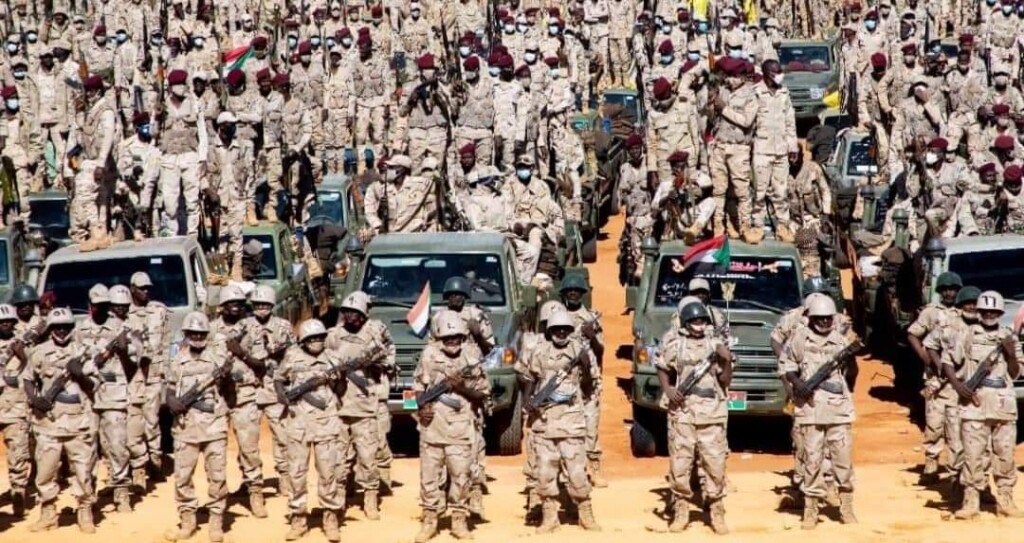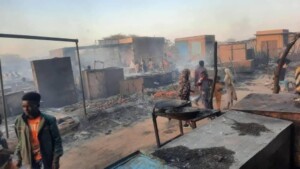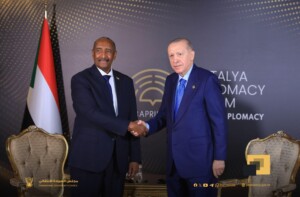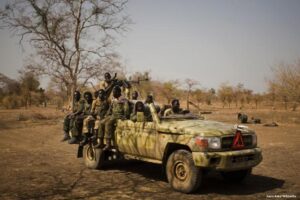Northern Sudan ‘ready to repel’ RSF

RSF forces near Merowe in northern Sudan, April 13, two days before the war with the Sudan Armed Forces erupted (File photo: RSF)
Northern Sudan, like eastern Sudan, is reportedly bracing for a Rapid Support Forces (RSF) invasion. Grassroots service and Forces for Freedom and Change (FFC) committees have been banned in Northern State, following similar directives in River Nile state. Coordinators have been appointed to protect people from Darfur living in the two states.
The director of Shendi and chair of Shendi Security Committee, Khaled Abdelghaffar, in River Nile state, alleged that the security situation was stable yesterday.
Shendi lies 160 kilometres northeast of Khartoum. He said that “everything is under control” after the RSF failed to infiltrate Nagaa, 170 kilometres northeast of Khartoum, and El Musawwarat, 20 kilometres north of Nagaa. The RSF was reportedly pushed back by members of the Sudan Armed Forces (SAF) Third Infantry Division.
“Shendi is ready to repel any aggression,” Abdelghaffar said. “All security forces, the Third Infantry Division, and the mobilised civilians are working day and night and in full coordination and cooperation in order to keep people safe and secure. We are monitoring all enemy movements.”
Late December, sources from Shendi also told Radio Dabanga that the SAF had deepened its defences in the town and was “ready for a possible confrontation.”
On the ground, the RSF has succeeded in expanding its territorial control in Darfur, Kordofan, and Khartoum, while SAF remains in control of northern, central, and eastern regions, including de-facto administrative capital Port Sudan. In December, an RSF offensive took El Gezira from the army’s control and threatened invasion of White Nile state and Sennar.
The war unmasked SAF’s ineptitude, conflict resolution expert Suliman Baldo asserts, “as its senior commanders became too steeped in grand corruption practices to pay attention to the decay of SAF as a fighting force.” Their adversary, the RSF, is “ethnically aligned, with plunder as the main motivation of its fighters.”
Civilian committees banned
Northern State Governor Abdeen Awadallah issued directives to dissolve grassroots services and FFC committees in the state on Saturday.
The directives followed similar directives by acting governor of River Nile state Mohamed El Badawi, who declared that FFC committees, resistance committees, and administrative committees were banned on January 8.
The decisions target the forces of the revolution, according to observers. The Northern State Services Committees described the decisions as “stillborn and void”. In a statement yesterday, they said they will work to combat these directives and “throw them in the dustbin of history, along with those who issue these decisions.”
Similar to committees in River Nile state, the committees in Northern State do not expect the directives to affect their work. “These decisions do not concern us and will not discourage us from moving forward on the path of the glorious December revolution, and stopping this damn war that is taking place between two parties who together committed crimes that are deplorable to history, before destroying Sudan for the sake of a power struggle.”
The statement called on the service committees and FFC members throughout the state to reject this decision, “which is not based on a constitutional or legal basis.”
Other observers noted that the directives are an indicator of the level of control and dominance supporters of the former Al Bashir regime have over the de facto government in Port Sudan and the state governments in northern and eastern Sudan.
Journalist and political analyst El Jameel El Fadil commented to Radio Dabanga: “These governors are now competing by issuing such decisions in an attempt to satisfy the central government that is dominated by groups targeting the Sudanese revolutionary movement in an attempt to obliterate it and erase it from existence.”
El Fadil stressed that this process will not work, “especially since the revolution has taken root, no one can stop its tide.”
In the wake of controversial mobilisation campaigns of civilians to protect their homes by the SAF, Adel Abdellatif, Imam of the Atbara Grand Mosque in River Nile state, climbed the mihrab of the mosque on December 22. He was wearing military uniform and carrying a Kalashnikov rifle. He urged the worshipers of the mosque to protect their lands.
The mobilisation based on ethnic background has been supervised by influential former members of the dissolved National Congress Party (NCP), according to Hatem Elyas, lawyer and human rights activist. At least 150,000 people have reportedly volunteered to conscript to the SAF since mobilisation calls on reservists and civilians escalated.
Darfur coordinator
The governor of the Darfur Region, Minni Minawi, yesterday issued a decree appointing coordinators for people from Darfur living in River Nile state and Northern State.
He appointed Omda El Taher Adam as the general coordinator of the people of Darfur in Northern State. The coordinator will live in the state and oversee matters affecting people from Darfur in the region.
The decision to appoint coordinators followed a decision by the governor to form a legal and social committee to follow up on the situation of the many people from Darfur detained in the two northern Sudanese states.
According to the Displacement Tracking Matrix of the International Organisation for Migration, 619,659 people have fled to River Nile state since April 15, when war broke out between the SAF and RSF. Most displaced persons nationwide are from Khartoum state (64 per cent), followed by South Darfur (17 per cent), North Darfur (9 per cent), Central Darfur (4 per cent), and West Darfur (3 per cent).
In December, Radio Dabanga reported that the authorities in River Nile state had launched a detention campaign for Sudanese originating from western Sudan, under the pretext of belonging to the RSF, which has sparked widespread criticism.
Al Jazeera reported that fleeing people arriving in Atbara were stopped by Sudanese military intelligence and asked if they were from Darfur or Kordofan regions. People from the two regions were accused of spying for the RSF, detained, beaten with sticks, and shocked with electric cables. At least dozens have been extrajudicially executed, according to videos verified by Al Jazeera.
Security forces detained dozens of young men from Darfur and Kordofan among residents and displaced in Wad Madani in mid-December, following instructions “under the state of emergency” by the governor of El Gezira, Ibrahim El Kheir.











 and then
and then